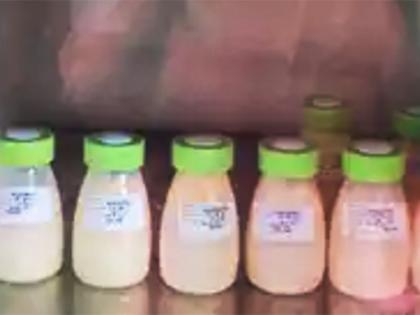The first government-run human breast milk bank has become a lifeline for many infants
By Anubha Jain | Updated: August 6, 2023 18:00 IST2023-08-06T18:00:00+5:302023-08-06T18:00:00+5:30
Inaugurated on March 8th last year Amrutha Dhare, the first state-run human breast milk bank has become a lifeline ...

The first government-run human breast milk bank has become a lifeline for many infants
Inaugurated on March 8th last year Amrutha Dhare, the first state-run human breast milk bank has become a lifeline for many infants and a lifesaver for abandoned babies. The initiative is helping to prevent the infant mortality rate from rising further. Situated on the premises of Vani Vilas Hospital of Bengaluru, the milk bank also collects milk from women who wish to donate breast milk, provided they ensure hygiene. So far, through the collected 250 ltrs. Of milk over 1500 beneficiaries have benefitted from Amrutha Dhare.
Dr. Savitha C, Medical Superintendent of the Vani Vilas Hospital informed that the beneficiaries include low birth weight and premature babies, babies whose mothers can’t breastfeed like deceased or sick mothers, mothers having insufficient breast milk after birth to feed new babies, and also the babies who have discarded at the hospital's neonatal ICU. Dr. Savitha said, “We have received milk from our in-house donors which are 700 in number, and from outside donors too. We do everything cost-free. Initially, we conduct pretesting, pasteurization, and post-testing to avoid any sort of infection. Then we freeze milk. Breast milk can be stored for up to 3 months in the freezer and 3 to 5 days in the fridge.” The donors are mothers in the hospital who have excess milk. They are counselled about the milk bank and also given a letter of appreciation after donation. From one mother at a time, 60-70ml of breast milk is collected and if required using a breast milk pump.
After the milk is collected, the sample is sent for bacterial analysis and then stored in the deep freezer at a temperature of -22 degrees Celsius. The bacterial analysis will be repeated after pasteurization to ensure safety and no contamination. Karnataka already has four human breast milk banks, but this is the first government set up milk bank. The milk bank has seen a rise in the number of people donating milk. Poor women from rural areas are lured into selling milk to these milk banks. At large, it has become a business for private players who would charge hefty amounts from people for breast milk. And hence, this government-run setup is a viable option.
Open in app